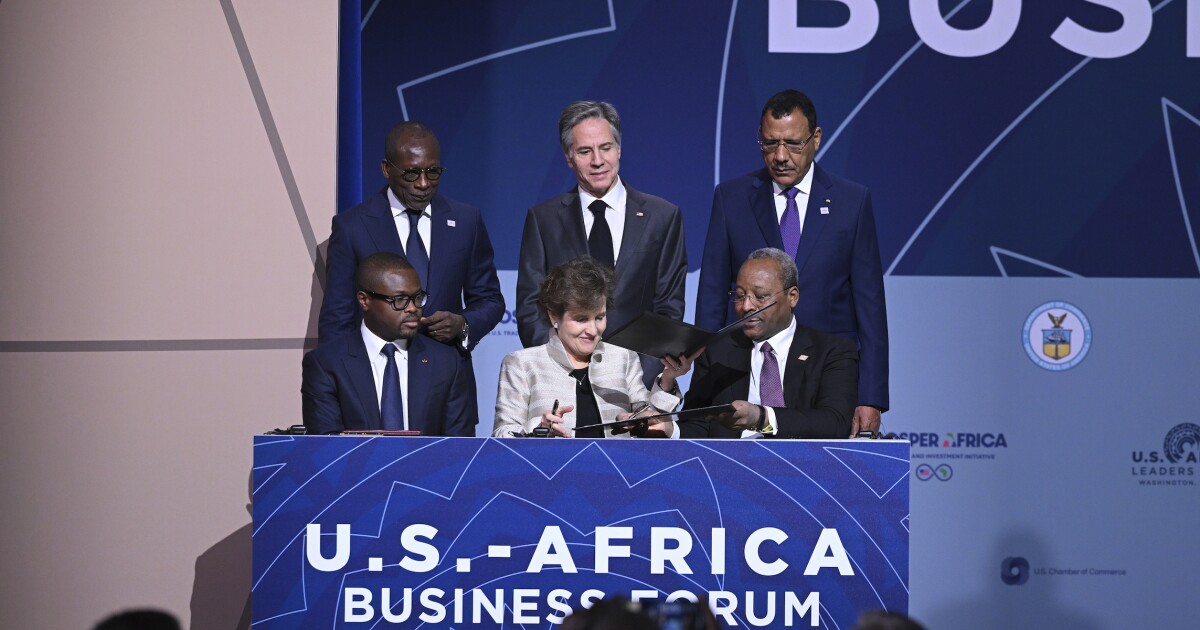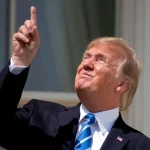

A multipronged initiative to increase economic development in Africa is underway as U.S. officials seek to capitalize on the continent’s population growth while blunting China‘s influence.
“We will step up our economic diplomacy efforts,” Secretary of State Antony Blinken told a business forum at the U.S.-Africa Leadership Summit in Washington. “For us, having this diplomatic presence around the world and in virtually every part of Africa is also a critical and unique asset for finding ways to strengthen the trade and investment relationships between our countries, to actually help identify opportunities for American business and, as a result, opportunities for Africa.”
American and African businesses also could benefit from U.S. government “commercial diplomacy,” in parallel with federal efforts to support infrastructure development in African states, Blinken said. The emphasis on those combined priorities reflected a recognition that China’s waxing influence in Africa could threaten U.S. interests if left unchecked.
“We’re going to be organizing more commercial diplomacy trips, where leaders from across the U.S. government and our private sector can work together to better identify African partners and source business opportunities together,” Blinken also said. “We’ll expand our work in all parts of the investment pipeline — from fostering investment opportunities to promoting viable deals to helping to close those deals.”
BIDEN TRIES TO OUTSHINE CHINA AND RUSSIA IN AFRICA
The new array of economic engagement dovetailed with a more open U.S. acknowledgment of the competition with China.
“China is new to this game on the continent; they’ve come to the conclusion that they need to focus attention on Africa because Africa is kind of the last frontier of resources and the last frontier of untapped possibilities,” U.S. Ambassador Linda Thomas-Greenfield told NPR in a Tuesday interview. “But our relationship, people to people, is very different from what the Chinese have been able to achieve. So, while there is clearly a competition, we think the U.S. is ahead of the game.”
That argument upends the conventional view that China’s “checkbook diplomacy” — more like predatory lending, to hear U.S. officials tell it — has given Beijing an efficient method for gaining influence in Africa. Chinese General Secretary Xi Jinping’s vaunted Belt and Road Initiative has paid strategic dividends for the communist regime, not least in the form of control over valuable ports.
“They’re putting these countries in debt; they’re providing infrastructure that many of us have seen that crumbles within a few years,” she said. “We’ve all seen the extent to which they are able to threaten African countries, including using their debt as a weapon against these countries.”
Blinken signaled the U.S. desire to address the infrastructure shortage that has given China that opportunity by presiding over the signing of a regional compact with Benin and Niger, an agreement backed by $504 million from the Millennium Challenge Corporation.
“As this group knows well, the port in Benin is critical to the economy of West Africa, the Cotonou port,” Blinken said at the signing ceremony earlier Wednesday. “The MCC compacts will invest more than half a billion dollars in that infrastructure, and they’ll do it with grants, which means that they won’t saddle governments with debt. The projects will bear the hallmarks of America’s partnership.”
Chinese officials have tried to deflect American criticism by evoking the negative memories of Western colonialism and Cold War rivalries.
“Africa is not a wrestling ground for major-country rivalry, still less a target of strong-arm tactic from a certain country or certain people,” Chinese Foreign Ministry spokesman Wang Wenbin said Wednesday. “The U.S. needs to respect the aspiration of the African people and take concrete actions to advance Africa’s development instead of being bent on smearing and attacking other countries.”
Whereas Blinken has taken a subtle approach to contrasting the U.S. and Chinese approach to African states, Thomas-Greenfield, the lead American envoy at the United Nations, offered a more explicit rebuttal and criticism of China.
CLICK HERE TO READ MORE FROM THE WASHINGTON EXAMINER
“The U.S. is one of the first countries to recognize African countries who were gaining independence, if we go back, even to Ghana in 1957. And we have never had a relationship of colonialism with the continent of Africa,” she told NPR. “We’re not telling Africans not to engage with China; we’re not choosing their friends for them or their partners for them. … If Africans make the decision that they want to engage with the Chinese, our goal is to help them get the best deal that they can possibly get. And they’re not getting that right now.“







